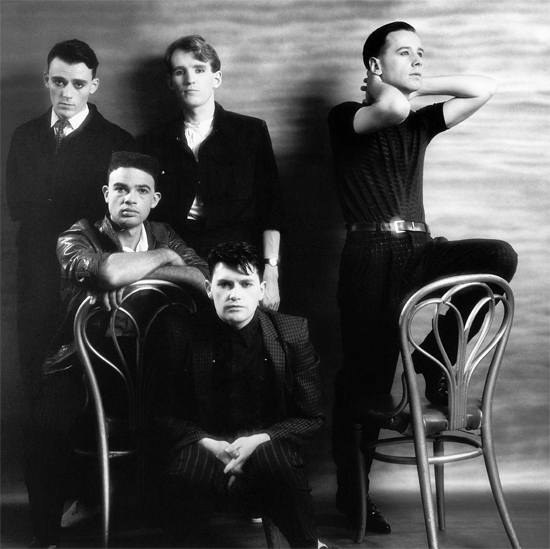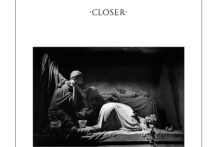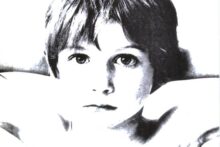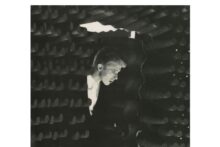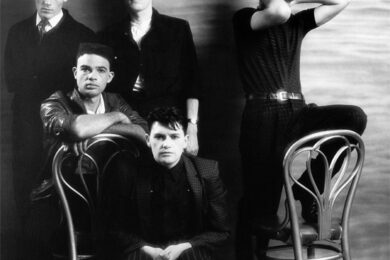“I think there is definitely with us a faultline between our early work and the MTV years – our ‘sellout’ years! It was a different attitude and a different band in the early days. As a band we were always keen to move ahead and that meant leaving certain things behind. I think that’s the case with any artists with long careers. Everyone moves on. However, we’ve got new management, a new agent, all of them younger, all of them into Simple Minds but… they prefer the earlier years!”
In the late 1980s, Simple Minds were one of the biggest groups in the world, writing stadium-swelling anthems earnestly laden with political goodwill such as ‘Belfast Child’ and ‘Mandela Day’. Unlike U2, however, mega-success never quite sat well with Simple Minds – certainly not with the fans of their post-punk beginnings, who now regarded them as swollen and ungainly where once they seemed fleet and quicksilver, nor within the band themselves, to whom success had come as something of a surprise – the “big hit from Mars” as Kerr himself puts it. America had featured in Kerr’s early lyrics frequently as an enticing mirage, a shimmering signifier of great promise and uncertainty, but it was only with their cover of ‘Don’t You Forget About Me’, a Keith Forsey song that the group only reluctantly recorded for The Breakfast Club soundtrack and didn’t even choose to include on their next album, that they “conquered” the USA.
Internal tensions, personnel departures and eventual commercial decline followed, before Simple Minds, revolving around the original nucleus of Kerr and guitarist Charlie Burchill, rediscovered some of their old manageability and form in the new century. And now, in a unique live project, they are touring their first five albums, featuring five songs from each on any given night.
“For ten years we had a stand-off with EMI and as a result the catalogue was neglected,” explains Kerr, who strikes a relaxed, good-humoured figure at ease with himself and comfortable with his present lot, in the restaurant of a Kensington hotel. “Now all that’s come together and we’ve found ourselves naturally digging out the early things. If you’d asked me about this ten years ago I’d have said, no, those songs have had their day. But in the last few tours we have put in a few early obscurities among the big hits and found that not only did they hold their own but they were the songs we looked forward to playing most. So this approach made perfect sense.”
Kerr also wishes to remind people “educated” in all those I Heart The Eighties documentaries, which caricature the decade as deely-bopping in three short hops from Duran Duran to Live Aid to the Yuppie era that there were overtones and undercurrents glibly ignored by the today’s grinning poptalgists. For all their singularity, Simple Minds were not the only band to follow a meaningful trajectory from punk to pop. Certainly, to make such a journey was only considered a “betrayal” by punk’s most lumpen element, the sort who sat scowling, Mohican-ed and left behind on benches along the Kings Road throughout the Eighties. For some, it was conscious and premeditated, like ABC and Scritti Politti, who devised a sort of meta-pop, an ought-to-be pop that was prettier, dramatic and more dazzling than whatever now constituted the “real” thing, transmitting Brechtian, fourth wall-breaking signals of acknowledgement to the hipsters and yet so caught up in the impassioned, self-adoring upward beauty of what they were doing as never to lapse into self-knowingness. New Order had had to reinvent themselves as a result of Ian Curtis’s death, The Associates couldn’t help themselves, while the likes of The Bunnymen and The Cure were irresistibly drawn out of the cult shadows. Others, like Wire and The Pop Group would have loved to have had hits, had they come their way. The charts were not to be distained but were a zone ripe for radicalisation, and beyond that, something undreamt of. All of these groups reached a zenith at the same time in 1982, arguably the finest ever year for pop.
“We had a voracious musical appetite and it was all over the place. The lead singer would love John Cale, the drummer’s favourite band was Wizzard! For us, our first overt pop moment was ‘Promised You A Miracle’ in ’82. But it was a different pop sensibility that year. The Associates, doing their haunting thing, Human League bringing something from the industrial synthpop era, ABC… We were all staying at The Columbia and we were all in there, us, Soft Cell, the Bunnymen, having these spiky pop hits.”
The NME’s Paul Morley incensed some, but not others, that year when he spoke of Simple Minds in particular as “post-ABBA”.
“I loved all that. The music papers were such a great influence. You could feed off the verbal energy. They could articulate a feeling in the air. John Peel could play your records, which was great, but when the papers put a context around it, or a great picture by Anton Corbijn, that was it. All that encouragement was just what you needed to continue, to get more on it. Also, the Morleys of the world helped create this narrative around it. It was a particular kind of pop – melodically strong, and yet very homemade, self-invented. Even with Trevor Horn working with ABC, it was still ABC’s vision.”
“Vision” was a key word; the “new pop” of 1982 felt colourised, dramatic, and carried its own, implicit manifesto. However, by the mid-80s, vision turned to video, and things changed for the worse.
“I remember doing our first video. And we asked, “What’s a video?” and someone said, “You know, like Queen do, all standing in a row.” Yeah, that changed so much – but it’s amazing that it’s come and gone. Went away ten years ago. We’re still paying for our videos! They were colossally expensive. Two videos cost more than an album. And the costs went into this black hole. And we were pretty well managed, God knows how bad it was for others.”

Simple Minds had begun life in 1977 as members of Johnny And The Self Abusers, an outfit who recorded one single for the Chiswick label which had helped crank up into musical life the likes of Kirsty McColl and Joe Strummer (as the 101ers). Eventually forming their own splinter group, Kerr and Burchill lucked out in their home city of Glasgow. “There’d been a couple of riots at punk gigs in Glasgow, by The Stranglers and so the city fathers banned visiting punk bands. Well, we weren’t visiting. So we were OK to play. And for two months, which then seemed like an eternity, there was a starvation of punk in Glasgow. So when we played, they were queuing round the block! There were Aberdeen punks, Dundee punks fighting Stirling punks – and it was horrendous, people jumping up and down, and me and Charlie looked at each other and said, “Wouldn’t it be great to do this for real?”
Prior to their first album, they augmented their line-up with a keyboardist, Michael McNeil, who would add much-needed dimension and shine – and a grasp of the instrument that was as influential as any punk platter – the sequencer, as inaugurated in pop by Giorgio Moroder in 1977.
“In 1977 we were playing a disco at Glasgow in the City Centre. There were always fights in this place. We spent the day doing fanzine interviews and getting drunk, Dutch courage because we were terrified of playing this gig. And as we were about to go on that night, the DJ said, you’re on after me but you’ve got a good few minutes, you’re OK, it’s a 12” I’m playing. And we had no idea what a 12” was. Anyway, it was Donna Summer’s “I Feel Love”. And on a mixture of cheap wine and speed it sounded even more extraordinary. Her voice sounded Arabic, that wail, not an R&B vocal at all. and the repetition – it felt on a par with the Velvets on “What Goes On”, or (Kraftwerk’s) Trans Europe Express. Couldn’t wait till the next day to get that record.
“By this point, too, sequencers became cheap. Punk bands could get hold of them. Up until then they took up half a room. Later, Charlie discovered this guy who played in a crap wedding band with a synthesizer, a sequencer. He was an accordion player, originally, would you believe, did weddings, got interested in the sequencer, only listened to top 30 stuff. This was Michael McNeil. We brought him in, gave him all this Krautrock stuff… That was a very fortunate move.”
Taken up by Arista via the good offices of manager Bruce Findlay, Simple Minds’s made their debut album, Life In A Day, released in 1979, is creditable enough but today feels like a rather slick amalgam of various old and new wave influences, from Roxy to Elvis Costello and particular, in its jaggedness, Magazine. Rhythmically it’s a bit regular and floorbound, while Kerr himself sings throughout in an oddly higher register than he would adopt later.
“That was sheer terror!” he laughs. “I have bittersweet emotions about that first album. Incredibly exciting, obviously. We were just starting to get a wee bit clever. We got a new keyboard in and he brought lots of frills and hooks. We got the deal, very exciting, John Leckie, the producer we wanted to work with even though we didn’t know what a producer did, he’d worked with all these bands like XTC, Magazine… I remember at the time, the result sounded professional, sounded impressive, but I privately felt there was something not quite right with it which I couldn’t articulate. No one else was saying anything, but… we went to press it, got the acetates, and as we were about to drive up to Scotland, someone gave me a cassette of Unknown Pleasures by Joy Division… and I thought, we’ve completely blown it. Our live stuff, our demos were a bit darker, more hints of the Velvets, etc, and no hint at all of The Boomtown Rats! I wanted to scrap it, make it again, but… I think we’d played the songs to death by the time we brought them to the studio, played around with them, got a bit clever with them and didn’t reproduced them in their raw state.”
Real To Real Cacophony, their second album, was released just months later in the same year and represented a step towards mid-season Minds. Kerr’s now sunken-chin vocals were more perfectly pitched, while, in sync with the times, and contemporaries such as Joy Division and Wire, Simple Minds were developing a more European sensibility, setting their faces Eastward rather than across the Atlantic as had been UK rock’s traditional wont. Which isn’t to say that they had forsaken their broodier, more noir-ish American heroes.
“We toured with Magazine, who were colossal and the fact they had no commercial success didn’t dawn on us. And despite what I felt about the first album, things were improving, we were getting calls from all these European producers, travelling to Dusseldorf, learning that life, absorbing those influences. Out of that came ‘Premonition’, ‘Factory’ and ‘Changeling’, going to those Berlin clubs and thinking, this is where it should go.”
Real To Real was more experimental in terms of rhythms, of establishing a space and equal dialogue between the instruments that is one of post-punk’s great legacies, as well as ambient. imagistic tendencies, as on the quasi-instrumental ‘Veldt’.
“It takes on board all the stuff missed out on with the demo, the Eno influences and so forth. At that stage, we didn’t think about hits. Lou Reed didn’t get hits, Magazine didn’t. Granted. Bowie and Roxy did, but hits were something way out there. I remember, we wanted to sign to Arista because it was the label of Patti Smith, Lou Reed, Iggy Pop. Then we went to their offices for the first time and the first thing you see into this plush, marble lobby is a huge portrait of Barry Manilow! The penny dropped that he was the guy who was paying for all this.
“Various influences crowded into the Minds, the stuff we’d been listening to for years. There was also a strong prog rock thing, Krautrock, but there was especially something about the energy of The Stooges – their albums, and the Velvets, they sold by the ton in Glasgow. There was a violence, a claustrophobia in common. Iggy once spoke about the sound the Stooges owing something to the Detroit automobile factories. Well, A stone’s throw from us was the railway yard and the cleansing factory, as they called it, the garbage dump. But I kind of liked those places – they were lit up strangely and there was something reassuring about the fact that there was constant activity in them, even when you opened your curtains at four in the morning.”
1980 saw the Minds release Empires And Dance, a defining achievement, an album greater than the sum of all that it had clearly absorbed, a student’s interrailing companion. Some of the arrangements are astonishingly vivid, as on the monochromatic back pages flicker of ’30 Frames A Second’, or the teasing, cinematic apparitions of ‘Kant-Kino’. It’s the opener, however, ‘I Travel’ whose impact was greatest, the track which set them alongside the loose assortments of industrialists, futurists and post-Bowie dreamers who were at that year’s vanguard. It’s a more fraught, locomotive take on Kraftwerk’s deceptively idyllic and picturesque ‘Europe Endless’ from Trans-Europe Express.
“Well, we were living that life, on tour, We were seeing the picture postcard stuff, statues parks and galleries – but bombs were going off, the Red Brigade had struck, or Baader Meinhof, or one time when we were in Paris, a synagogue had been set fire too – there was danger in the air. Against the backdrop, you’ve got classical Europe, you’re reading Graham Greene and Albert Camus… and back in London, there were so many independent cinemas showing these great Italian and French classics – it all fed in, that and our own experiences. We seemed to be in Berlin every week there, going through the corridor from Hamburg, seeing all these Russian guards and feeling like these post-war kids, able almost to touch that.
“We were really finding our feet then, that it was our thing coming together, this is Simple Minds. We were starting to meet the other bands – The Bunnymen, The Teardrop Explodes, OMD, and swapping notes. I’d been to the Faust concert in Glasgow, Ian McCulloch had been to the one in Liverpool, or Andy McCluskey had been to see Tangerine Dream the same as me. All us oddballs in our different cities, with so much in common despite the differences in our bands.”
In 1981, along with Japan, Simple Minds switched to Virgin, where they would record Sons And Fascination, produced by, of all people, Steve Hillage, formerly of Gong, who, although he would re-emerge in the 1990s playing alongside The Orb, could not have been less fashionable in the early 80s. But then, even when it was least expedient to do so, Kerr always gave credit to UK prog rockers like Genesis, whose sense of expansiveness they shared.
“The band could have gone either way back then. We loved Empires And Dance and revelled in it but relatively speaking, it didn’t sell a bean. And we were three albums in the hole with Arista by that point. They’d sensed that we weren’t The Cars . . .we weren’t too panicked ourselves because we could see it was happening. We were doubling our audience every time we went out. But we heard from an insider at Arista, a Glaswegian, who told us, “They’re gonna drop you.” Which we thought was great – we’ll wipe out the debt, it’ll be gone and someone else will pick us up. And we’d heard Virgin were interested. But then, of all the fucking things – just as Arista were thinking of dropping us, Sounds ran this thing called the Futurist charts and they saw us in there alongside Japan and Spandau Ballet. So they were keener, even if we wanted out – they had all kinds of ideas, including dropping the rest of the band and keeping me, God knows how that would have worked out – and me saddled with all the debts!”
If on Empires And Dance, the paperback and travelogue influences were still semi-visible, by the time of Sons And Fascination, the Minds felt more abstract and elusive. It was, crucially, hard to see where they were coming from, hard to see where they were going. Sometimes they would crash and storm through the haze with the likes of ‘Love Song’, other times dart about in an epic suspension, as on the solemn, blissful, throbbing sequencer- borne ‘Seeing Out The Angels’, fleetingly in and out of focus. They belonged somewhere and nowhere, the interplay of their instrumentation so delicate and adept that it was as if, at times, they had achieved airborne status. But there was more to come, felt Kerr. They were spilling over with a surfeit of material.
"All the musicians were writing like hell – Burchill, McNeill, Derek Forbes on bass… but we ran out of budget. And Virgin wouldn’t give us the extra. So it felt short. Eventually, Sister Feelings Call came out as a bonus album but so many people liked it as much it got a full release. Some of the mixes suffer from lack of budget when I listen back.”
After the determined broodiness of Real To Real Cacophony and Empires And Dance, in which they danced shadows of their past and their rock heroes, now the Minds had found a sunlit upland of their own. This was ironic, in spite of the fact that politically, the worst effects of the early Thatcher years were beginning to kick in, with all their attendant recession and revulsion. And yet, despite standing in conscious opposition to all of this, the best music of the time was infected with a sense of delirium, vastly removed from the trite hedonism of Duran Duran, following the demise of Joy Division. It’s dreadful to herald the tragic suicide of a young man in a Macclesfield kitchen as a moment of pop cultural release, but something of the sort did happen. The mood of the very early 80s was uncontrollably, inexplicably sanguine, a psychic release from a period of overcoat gloom. Simple Minds surged on the crest of this; “Great times, in commotion”, as Kerr sang on ’20th Century Promised Land’.
“There was still a great deal of intensity but Charlie would come up with these chimes and highlights that would bring light into the picture. Even within ‘In Trance As Mission’, there’s a joy in there . . . Joy about what? Fuck knows. I try and describe it as the air clearing after the storm, the Heavenly shafts on ‘Theme For Great Cities’ and ‘Seeing Out The Angels’. That was the spirit of the band, and maybe the spirit of the times. I think you’re right in saying that Joy Division had made such an impact and a million of those kind of bands followed in their wake, including us to an extent. It was about looking outward, an opening out, rather than this introversion. It was very powerful when it happened, and culminated in this new, shining pop music…”
As vocalist, Kerr stood amid all this, assuming postures of wild, gazing surmise, generating lyrics that avoided grammatical sense, functioned more as tag clouds that highlighted the buzz and mood of the music in which he was wreathed.
“I don’t make the music. I’m a great cheerleader for it. I maybe pull the territory together, bring the records to the party, drum up the culture. I’m a listener myself. And I listen to it for months, and really get into it. One of the best moves I ever made was not to sing on ‘Theme For Great Cities’. I remember walking around with that in Glasgow on my new Sony Walkman thinking this is fucking perfect. But I was writing lyrics to match the tones of the music, that suited these very powerful pictures. I could feel that welling through…”
Lost in their own clouds, anything felt possible. Following Sons And Fascination, Simple Minds found themselves booked on a tour of Australia, supporting Sydney favourites Icehouse.
“You don’t expect much reaction as the support band but people were going nuts. In Australia they had fantastic pirate-style radio and all the British stuff was being played on bootlegs, from the Banshees right through – and these stations had huge ratings and we heard ourselves being played constantly. We left the country holding gold discs! And I remember feeling, this pop star lark, it’s pretty good. And I don’t think it’s any coincidence that the first song we wrote when we got back was as catchy as ‘Promised You A Miracle’.”
Kerr says “catchy” but ‘Promised You A Miracle’ for all its accessibility and retrospective familiarity is as far a cry from the preset patterns of regular pop as can be imagined. It teeters arrhythmically, glitters and starts, breaks out in distant showers of tinsel and manna. It conjures not just possibilities for a better pop but a better life, to which music could act as some sort of wormhole. The title track, with its auric, chariot momentum, trailing clouds into the future; “81, 82, 83, 84…” epitomises the spirit of the album; that the rapid evolution of punk to pop, of which the Minds were a part would somehow herald something somehow better soon, an infinitely long cultural Summer to come. “It’s sweeping towards something or somewhere grander,” says Kerr.
Perhaps the album’s crowning, overflowing, nectarine moment is when Herbie Hancock walks in from nowhere on ‘Hunter And The Hunted’ and delivers a guest keyboard solo, all dazzling, spiralling curlicues, that feels like an act of benediction from the Gods. But sheer chutzpah and cheek brought off Hancock’s appearance, borne of absolute self-confidence.
“The amazing thing was the producer, Pete Walsh he’d worked with Heaven 17. We did ‘Miracle’ first with him. We were only in our early 20s, he was only in his teens. He was a kid. But he and his elder brother had somewhow both worked with Herbie Hancock, and he was at the Townhouse at the time as us. So our guys were never slow in coming forward; “Play a wee bit, Herbie!” And he rolled the track a couple of times and, as we’re finding out, it’s a difficult thing to emulate. What a cameo.
“I have the most beautiful memories of New Gold Dream. It was made in a time between Spring and Summer and everything we tried worked. There were no arguments. We were in love with what we were doing, playing it, listening to it. You don’t get many periods in your life when it all goes your way.”
1982 was the year of multiple achievements in which the art of pop music, made consciously, to test the very limits of the possible, reached a zenith. ABC’s The Lexicon Of Love, The Associates’ Sulk… and New Gold Dream. The task of following these albums would prove invidious, impossible in each case. There were the New Romantics and the True Romantics, like the Minds, who believed, like the early 19th Century poets, in the transformative, superseding possibilities of art, rather than mere adherence to classic traditionalism. But it was not to be. New Gold Dream was all that Heaven allowed.
“No matter who it is, whether it’s Springsteen or Bowie, they get certain moments that they’re never going to beat. And what word we all learned from the NME, the Zeitgeist. You get to hark back to it, maybe revisit another version of it… but it slips through your fingers. We were big, but not at the point where jobs depended on us. That came later.”
Simple Minds’ achievement of superstar status felt ironic and anti-climactic to many. Not a happy period, one in which they collapsed into mortality, they were ungainly and overbearing rather than overwhelming. Kerr will defend the Minds but acknowledges it was never quite the same as ’83 turned into ’84 and beyond.
“I think we started to try to hard. Again, nothing I’d apologise for. But there was this thing like footballers scoring for fun, getting a big transfer and feeling they have to justify it. Fortunately with us, it wasn’t quite from Mars, wasn’t quite instant and overnight, we grew towards it – but you’re never quite ready. It was a comfortable, manageable success. Your band hadn’t turned into an industry. And when it does come, oh, poor me! Who am I to complain about it? It’s really not such a bad life…"
Simple Minds’ 5×5 is out now. Tour dates here

